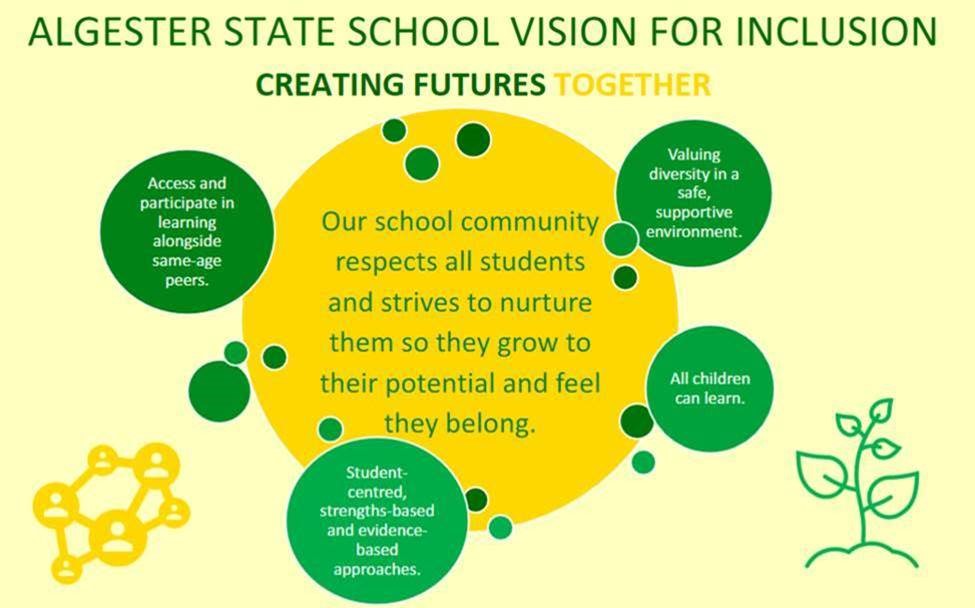Inclusive education – Students With Disabilities
 Algester State School Inclusive Vision
Algester State School Inclusive Vision
As a school, we work together to make sure all students have access to high quality learning experiences, focussed on their individual needs. To meet the needs of students with a range of social, cultural, community and family backgrounds and of all identities. it's not about providing individuals with the same, but instead providing them with what they need to be successful and empowered. For each unit of work, year level teams and inclusion teachers plan for differentiation and adjustments to meet the needs of learners in their class. These are based on reflection on assessment of students current needs.
The Hub
Our school has a team of Inclusion Teachers (students with disability) and Inclusion Teacher Aides and Head of Special Education Services, who are based in the Hub. They work in collaboration with classroom teachers to understand each student with disability in order to plan and implement differentiation and adjustments.
Student Services Team
This team consists of:
- Head of Special Education Services
- Guidance Officer
- Inclusion Teacher – literacy and numeracy
- Speech Language Pathologist
- Social Worker
- Deputy Principals
- Principal
Our commitment means that children and young people across Queensland, from all social, cultural, community and family backgrounds, and of all identities and all abilities are able to:
- attend their local state school or education centre and be welcomed;
- access and participate in a high-quality education and fully engage in the curriculum along-side their similar-aged peers;
- learn in a safe and supportive environment, free from bullying, discrimination or harassment; and
- achieve academically and socially with reasonable adjustments and supports tailored to meet their learning needs.
https://education.qld.gov.au/students/inclusive-education
Inclusive Education Policy Statement
Schoolwide Support Programs
The framework for support provisions at Algester varies from year to year based on several factors including school priorities, staffing allocations and the needs identified in the school data.
The Inclusion Teachers: Literacy and Numeracy work collaboratively with class teachers to develop and implement targeted support programs for identified students in the areas of Literacy and Numeracy. The current support provisions are primarily an in-class model.
Supporting students within the classroom environment takes many forms and may include:
Content - individual task specific goals to be developed
Process - the ways in which student's learn
Product - documented evidence of student's learning
Environment - the physical and emotional setting of the classroom
Some specialised intervention programs are also provided for additional support for students that take place using a classroom withdrawal model, usually with a teacher aide and a small number of students. The school's programs are:
MiniLit (Prep-Year 1)
MacqLit (Year 2-6)
Rip-It-Up Reading (Year 3-6)
Black Sheep Oral Language Program (Prep)
Move to Learn Program (Prep)
Support-a-Talker & Story Club (Prep)
Guidance Officer (GO)
The Guidance Officer works with the Administration Team and as part of the Student Services Team. Teachers, parents and students can initiate a referral to the Guidance Officer through the Student Services Team.
Concerns raised are usually of a behavioural and/or learning nature. Ways to solve issues cover collaborative consultation, problem-solving, counselling and contracting, teaching, referral to out-of-school agencies and assessment and reporting.
The Guidance Officer will work with referred clients to:
- identify concerns
- discover ways to solve the problem
- determine responsibilities
- monitor change
- develop a picture of how things may change when the problem is solved.
Speech Language Pathologist
A Speech Language Pathologist provides speech language assessments and programs for children experiencing difficulties in speech language development. Referrals to the Speech Language Pathologist can be made by class teachers through the Student Services Team.
English as an Additional Language/Dialect Teacher
Our school provides assistance to students who are more proficient in a language or dialect other than Standard Australian English and need support to develop proficiency in Standard Australian English. On enrolment, the EAL/D Teacher assesses the needs of a student and a whole-school approach supports EAL/D learners. The type of support is dependent on EAL/D learner’s level of English language proficiency in speaking, listening, reading and writing.
School Chaplain
Scripture Union QLD chaplains, or 'chappies', provide spiritual and emotional support to school communities. They are in the prevention and support business: helping students find a better way to deal with issues ranging from family breakdown and loneliness, to drug abuse, depression and anxiety. They provide a listening ear and a caring presence for kids in crisis, and those who just need a friend. They also provide support for staff and parents in school communities.
School chaplains are unique:
They are a support conduit – connecting students (and school staff) to specialist services in the community such as welfare groups, counselling services, medical services and community groups in consultation with School Principals.
They build relationships with students (and staff). They are a trusted adult in the playground and in the classroom – offering a listening ear to students who want to share their problems and experiences.
Their role is to contribute to the spiritual and emotional wellbeing of the school community.
They are seen by students as an adult who is not a part of the school’s authority structure. Scripture Union is the employing authority for the school chaplain and they have information about school chaplaincy programs on their website.